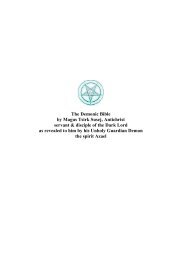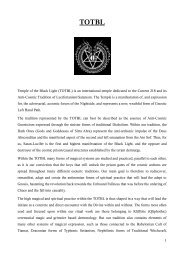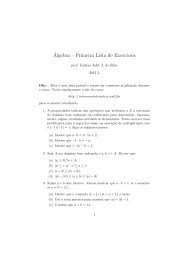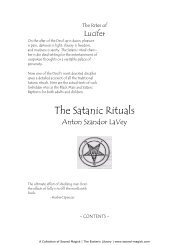Satanism Today - An Encyclopedia of Religion, Folklore and Popular ...
Satanism Today - An Encyclopedia of Religion, Folklore and Popular ...
Satanism Today - An Encyclopedia of Religion, Folklore and Popular ...
Create successful ePaper yourself
Turn your PDF publications into a flip-book with our unique Google optimized e-Paper software.
320 Appendix II: 1992 FBI Study <strong>of</strong> Satanic Ritual Abuse<br />
al victimization cases that seems to have been lost. Is the<br />
victim describing events <strong>and</strong> activities that are consistent<br />
with law enforcement documented criminal behavior, or<br />
that are consistent with distorted media accounts <strong>and</strong><br />
erroneous public perceptions <strong>of</strong> criminal behavior<br />
Investigators should apply the “template <strong>of</strong> probability.”<br />
Accounts <strong>of</strong> child sexual victimization that are more like<br />
books, television, <strong>and</strong> movies (e.g., big conspiracies,<br />
child sex slaves, organized pornography rings) <strong>and</strong> less<br />
like documented cases should be viewed with skepticism<br />
but thoroughly investigated. Consider <strong>and</strong> investigate all<br />
possible explanations <strong>of</strong> events. It is the investigator’s<br />
job, <strong>and</strong> the information learned will be invaluable in<br />
counteracting the defense attorneys when they raise the<br />
alternative explanations.<br />
For example, an adult survivor’s account <strong>of</strong> ritual<br />
victimization might be explained by any one <strong>of</strong> at least<br />
four possibilities: First, the allegations may be a fairly<br />
accurate account what actually happened. Second, they<br />
may be deliberate lies (malingering), told for the usual<br />
reasons people lie (e.g., money, revenge, jealousy). Third,<br />
they may be deliberate lies (factitious disorder) told for<br />
atypical reasons (e.g., attention, forgiveness). Lies so<br />
motivated are less likely to be recognized by the investigator<br />
<strong>and</strong> more likely to be rigidly maintained by the liar<br />
unless <strong>and</strong> until confronted with irrefutable evidence to<br />
the contrary. Fourth, the allegations may be a highly<br />
inaccurate account <strong>of</strong> what actually happened, but the<br />
victim truly believes it (pseudomemory) <strong>and</strong> therefore is<br />
not lying. A polygraph examination <strong>of</strong> such a victim<br />
would be <strong>of</strong> limited value. Other explanations or combinations<br />
<strong>of</strong> these explanations are also possible. Only<br />
thorough investigation will point to the correct or most<br />
likely explanation.<br />
Investigators cannot rely on therapists or satanic<br />
crime experts as a shortcut to the explanation. In one<br />
case, the “experts” confirmed <strong>and</strong> validated the<br />
account <strong>of</strong> a female who claimed to be a 15-year-old<br />
deaf-mute kidnapped <strong>and</strong> held for three years by a<br />
satanic cult <strong>and</strong> forced to participate in bizarre rituals<br />
before recently escaping. Active investigation, however,<br />
determined she was a 27-year-old woman who could<br />
hear <strong>and</strong> speak, who had not been kidnapped by anyone,<br />
<strong>and</strong> who had a lengthy history <strong>of</strong> mental problems<br />
<strong>and</strong> at least three other similar reports <strong>of</strong> false<br />
victimization. Her “accurate” accounts <strong>of</strong> what the<br />
“real satanists” do were simply the result <strong>of</strong> having<br />
read, while in mental hospitals, the same books that<br />
the “experts” had. A therapist may have important<br />
insights about whether an individual was traumatized,<br />
but knowing the exact cause <strong>of</strong> that trauma is another<br />
matter. There have been cases where investigation has<br />
discovered that individuals diagnosed by therapists as<br />
suffering from Post-Vietnam Syndrome were never in<br />
Vietnam or saw no combat.<br />
Conversely, in another case, a law enforcement<br />
“expert” on satanic crime told a therapist that a patient’s<br />
accounts <strong>of</strong> satanic murders in a rural Pacific Northwest<br />
town were probably true because the community was a<br />
hotbed <strong>of</strong> such satanic activity. When the therapist<br />
explained that there was almost no violent crime<br />
reported in the community, the <strong>of</strong>ficer explained that<br />
that is how you know it is the satanists. If you knew<br />
about the murders or found the bodies, it would not be<br />
satanists. How do you argue with that kind <strong>of</strong> logic The<br />
first step in the assessment <strong>and</strong> evaluation <strong>of</strong> victim<br />
statements is to determine the disclosure sequence,<br />
including how much time has elapsed since disclosure<br />
was first made <strong>and</strong> the incident was reported to the<br />
police or social services. The longer the delay, the bigger<br />
the potential for problems. The next step is to determine<br />
the number <strong>and</strong> purpose <strong>of</strong> all prior interviews <strong>of</strong> the<br />
victim concerning the allegations. The more interviews<br />
conducted before the investigative interview, the larger<br />
the potential for problems.<br />
Although there is nothing wrong with admitting<br />
shortcomings <strong>and</strong> seeking help, law enforcement should<br />
never abdicate its control over the investigative interview.<br />
When an investigative interview is conducted by or<br />
with a social worker or therapist using a team approach,<br />
law enforcement must direct the process. Problems can<br />
also be created by interviews conducted by various intervenors<br />
after the investigative interview(s).<br />
The investigator must closely <strong>and</strong> carefully evaluate<br />
events in the victim’s life before, during, <strong>and</strong> after the<br />
alleged abuse. Events to be evaluated before the alleged<br />
abuse include:<br />
Background <strong>of</strong> victim.<br />
Abuse <strong>of</strong> drugs in home.<br />
Pornography in home.<br />
Play, television, <strong>and</strong> VCR habits.<br />
Attitudes about sexuality in home.<br />
Extent <strong>of</strong> sex education in home.<br />
Activities <strong>of</strong> siblings.<br />
Need or craving for attention.<br />
Religious beliefs <strong>and</strong> training.<br />
Childhood fears.<br />
Custody/visitation disputes.<br />
Victimization <strong>of</strong> or by family members.<br />
Interaction between victims.<br />
Events to be evaluated during the alleged abuse<br />
include:<br />
Use <strong>of</strong> fear or scare tactics.<br />
Degree <strong>of</strong> trauma.<br />
Use <strong>of</strong> magic deception or trickery.<br />
Use <strong>of</strong> rituals.<br />
Use <strong>of</strong> drugs.<br />
Use <strong>of</strong> pornography.
















